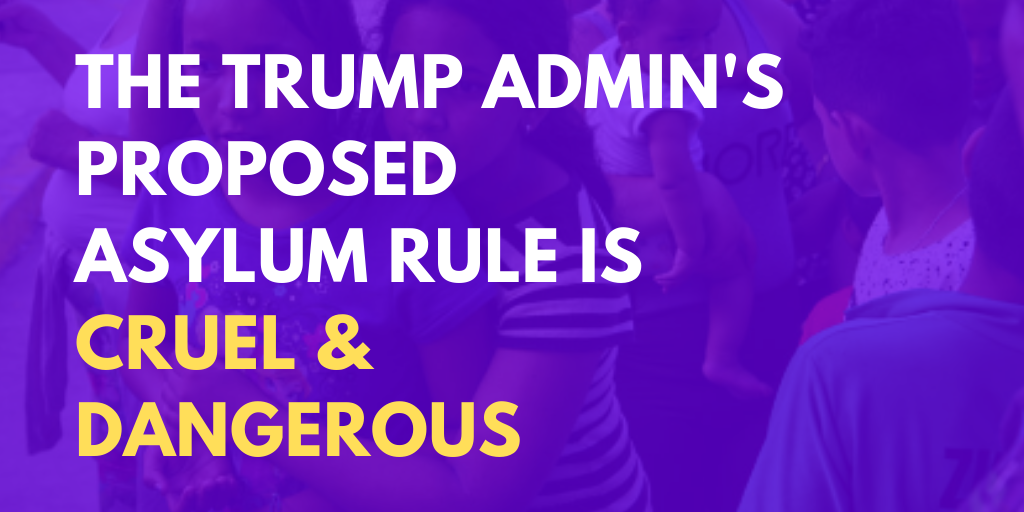
On June 15, 2020, the Trump Administration’s Department of Homeland Security and Department of Justice issued a proposed change to asylum rules that would eviscerate the grounds on which women and LGBTQ+ persons can seek asylum in the United States.
Across the world, women are persecuted for the basic fact that they are women. Erasing the claim to asylum for gender-based persecution does not erase its pervasive existence in the world – it just prevents women from receiving protection.
The Women’s Law Project strongly opposes this rule.
Last night, we submitted a formal comment to the Departments to describe the ways this rule will endanger women and LGBTQ+ persons around the world. Review our comment here.
What Changed in Trump’s Proposed Asylum Rule
The proposed rule change would, among other things:
- Eliminate gender as grounds for persecution, including status as a trans- or a gender-nonconforming individual;
- Make it impossible to claim domestic and sexual violence as reason for persecution; and
- Make it impossible to seek asylum due to persecution for being a feminist or LGBTQ+ activist.
Women face exceedingly high rates of gender-based violence around the world:
- Approximately 1 in 3 (35%) women worldwide have experienced physical and/or sexual violence.
- An estimated 200 million women have experienced female genital mutilation.
- Women and girls account for 72% of all human trafficking victims globally. Of those women and girls, the majority are trafficked for the purpose of sexual exploitation.
- 650 million women and girls worldwide were married before the age of 18.
Eliminating gender-based reasons as a valid ground on which to claim persecution will effectively lock women, transgender, and gender-nonconforming people out of the American asylum system.
In Pennsylvania specifically, many migrants come from countries where their sexual and gender-nonconforming identities must be hidden for fear of either state-sanctioned killing, or culturally condoned murders. For example, authorities turn a blind eye to so-called “honor” killings in Afghanistan, the home country to the majority of Pennsylvania’s migrants so far in 2020.
The Effect of Removing “Interpersonal Disputes” as a Ground for Claiming Persecution
Under the 1951 Convention on the Status of Refugees, a well-founded fear of persecution may be on the grounds of race, religion, nationality, political opinion, and membership in a particular social group (PSG). Generally, this would include any group of persons who share common characteristics, other than being persecuted. This shared characteristic is one which is immutable or fundamental to the identity, conscience, or exercise of one’s human rights.
The Departments, however, changed the definition of a “particular social group.”
Under the proposed change, the Departments stipulate that claims will not be “favorably adjudicated” on account of a PSG consisting of or being defined by “interpersonal disputes that governmental authorities were unaware of or uninvolved in,” among other conditions.
This distinction informs response to domestic violence. Domestic violence is perpetuated within abusive personal relationships, and often goes unreported to authorities.
Many survivors may already know, either from their own past experience or from the experiences of others, that the authorities cannot or will not protect them. They may also fear that alerting authorities will alert the perpetrator that the survivor is attempting to escape the household. Thus, governmental authorities may be “unaware of” or “uninvolved in” domestic disputes, and therefore the victims will be unable to seek asylum in the United States.
The Effect of Redefining “Political Opinion” to Remove Retaliation Against Activism as a Ground for Claiming Persecution
Finally, the proposed rule changes the definition of “political opinion.”
The newly proposed, narrowed view of political opinion would recognize “political opinion” only as those beliefs specifically related “to political control of a state or a unit thereof,” meaning that only opinions expressly held against a politician or government entity will be recognized as a ground for persecution. Previously, the definition of “political opinion” encompassed not only causes against a state or a political entity, but also movements against a culture.
Changing this definition will deny protections to feminist and LGBTQ+ activists whose fights for equality expose them to retaliatory violence.
In 2012 in Pakistan, the Taliban shot Malala Yousafzai three times because of her strong advocacy for women and girls to be educated. Under the proposed rule change, Malala would not be eligible to seek asylum in the United States because she was opposing the Taliban’s ban on girls attending school, and not a government entity.
On all levels, the proposed changes undermine the Women’s Law Project’s values and mission to protect the safety of all people, specifically women and LGBTQ+ individuals. Should the discriminatory proposed rules be approved and enforced, the lives and futures of asylum seekers would be threatened irreversibly for generations to come.
Authors: WLP Legal Interns Kate Doyle and Nicole Rubin
The Women’s Law Project is a public interest law center in Pennsylvania devoted to advancing and defending the rights of women, girls, and LGBTQ+ people in Pennsylvania and beyond.
July 2020: Our physical offices are still closed due to the pandemic but we are OPEN and working to serve your needs. Contact us here. Sign up for WLP’s Action Alerts. Stay up to date by following us on twitter, Facebook, and Instagram.
We are a non-profit organization. Please consider making a one-time donation or scheduling a monthly contribution.


